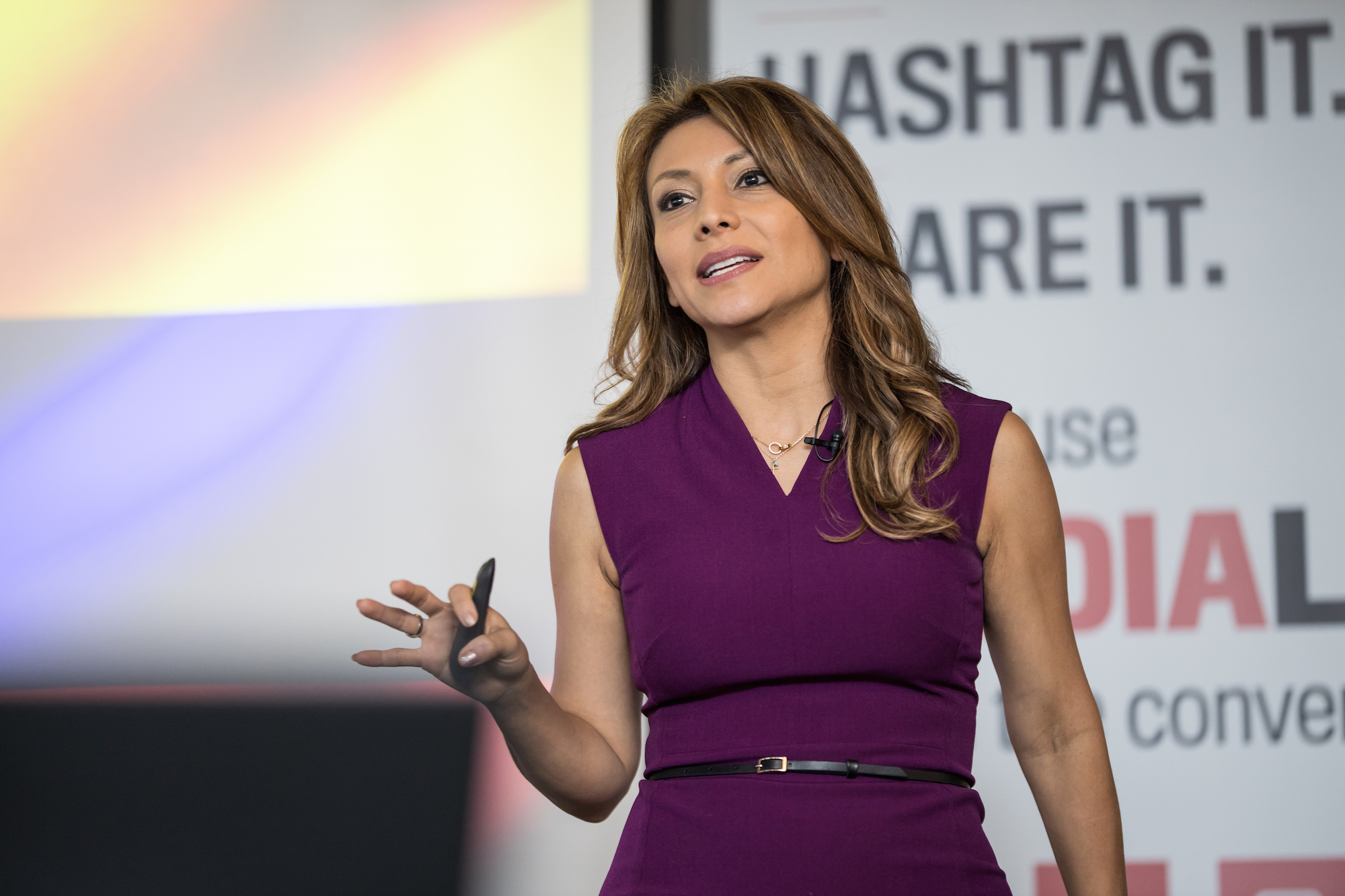
A New Type of Intelligence
“Cultural Intelligence” is the key to business survival in the 21st century, says NYC expert Lili Gil Valletta.
When Lili Gil Valletta first came to the United States of America from Colombia, she landed far from the corporate boardrooms she now operates in with ease. At 17, Valletta was sent stateside alone, by parents wanting to keep her protected from the violence in Colombia stoked by Pablo Escobar and narcotrafficking.
“I didn’t know English and I came with a student visa, pocket translator, suitcase and a lot of dreams,” said Valletta in a visit to AL DÍA on May 29, 2019.
The place she arrived in the U.S. couldn’t have been further from her home country. Valletta spent her first years in America honing her English at a small Christian school in Keene, Texas — a small municipality of six thousand just south of Dallas-Fort Worth.
“Talk about a culture shock,” said Valletta.
Her presence was also a culture shock for those from the small Texas town. Valletta’s native Spanish was associated with nearby Mexico, but in explaining her Colombian heritage, she was immediately associated with the “narcos” she escaped.
“I think that was my first exposure to the idea of culture,” said Valletta.
Nowadays, individuals rightly point out the injustice of such assumptions about another’s culture, but Valletta saw no discrimination. She saw the misunderstanding of her culture as an opportunity to teach.
“I took it as a project to educate people,” said Valletta.
It’s the same approach Valletta would use years later to conceptualize her idea of cultural intelligence and sell it to boardrooms across the world. But first she had to get a seat at the table.
In her visit to AL DÍA in May, an older Valletta described her young self as a “nerd”. At Southwestern Adventist University in Keene, Valletta earned a Bachelor’s in Business and graduated with a 3.8 GPA — a ‘low’ mark she still remembers for getting one ‘C’ in a choir class.
“It starts with excellence and dedication from day one,” said Valletta of her career approach.
Afterwards, she left Keene for the University of Colorado, where she earned her Master’s of Business Administration. Her first job came with Disney, where she played a role in the creation of Celebration, Florida — Walt Disney’s planned town near the Walt Disney resort in Orlando, Florida.
Valletta worked in the partnership between Florida Health and Walt Disney to create Celebration’s health system. It was all part of Walt Disney’s vision.
“If you break your leg at one of the parks, you end up at a hospital that looks like La La Land,” said Valletta.
During the groundbreaking of Celebration Health, Valletta met leaders from Johnson and Johnson, one of the many partners on the Disney project. They encouraged her to apply for a leadership program in the company and she did.
“They kind of stole me away,” said Valletta.

At Johnson and Johnson, Valletta was part of a program with 15 other people looking to quickly rise in the company’s ranks.
“Let me be in the C suite before 40,” Valletta recalled telling herself.
It was an obsession she now looks back on as unhealthy, but the initiative ran in her family. Valletta’s mother graduated from university in Colombia as one of the only female chemical engineers and through perseverance, became the first female executive at a big oil company in the country.
At the time of Valletta’s change to Johnson and Johnson, there was only one female in the C suite, named JoAnn Heisen — the company’s Chief Information Officer. Valletta made it her mission to get to know and emulate Heisen.
“I stalked her for like five months,” said Valletta. “I told her: ‘I want to be just like you.’”
While it may seem overzealous, Valletta’s approach to business allowed her to quickly climb within Johnson and Johnson. Before 30, she had a team of more than 50 reporting to her.
“It was insane that they trusted me with that,” recalled Valletta.
But her go-getting attitude is one that would come to define Valletta’s career, and one that inspired the biggest risk she ever took.
In her 10 years at Johnson and Johnson, Valletta rose to be arguably the most powerful Hispanic at the company.
Because of this, she was tasked with organizing the other Latinos and Latinas in the workforce. She did so under the banner of HOLA — The Hispanic Organization of Leadership and Achievement.
To Valletta, HOLA was not just a tool to organize people. She wanted it to produce results for the company.
“I didn’t want to just be the Cinco de Mayo party in the lunchroom,” said Valletta.
For results, Valletta began looking at the demographic data available on the U.S. Latino population. What she found was a massive untapped market of potential for business.
But to reach it, Valletta and Johnson and Johnson needed to understand its intricacies. And so, cultural intelligence was born.

“This is not about marketing. This is about organizational transformation, a new way of measuring ourselves,” said Valletta.
In more concrete terms, cultural intelligence is the ability to proactively recognize trends as a commercial advantage. For Valletta at Johnson and Johnson, that trend was the rapidly-growing Hispanic population in the U.S.
While no longer the largest immigrant population coming to the U.S., the population growth spurred by Hispanics and other minorities in the U.S. has outpaced that of the white population.
RELATED CONTENT
“We are now a majority minority nation,” said Valletta.
With that knowledge in hand, she presented a strategy guided by cultural intelligence to the Johnson and Johnson board. They loved it, but wanted to outsource the work. When Valletta couldn’t find a company to do it right, she made the plunge into starting a business that could.
When Valletta left Johnson and Johnson, it was 2009 and many were still piecing together the damage done by the 2008 housing market collapse.
“My J&J people thought I was crazy,” said Valletta.
The timing may have seemed poor for any entrepreneur, but it turned out that there was an acute need for what Valletta’s concept of cultural intelligence provided. The 2010 census was right around the corner, giving Valletta and her business partner fresh data to take to the boardrooms of potential clients.
Valletta’s company is called CulturIntel, and uses AI algorithms to analyze online cultural trends to formulate marketing strategies. However, when she enters a boardroom today, she’s not selling her company. The education she provides is no different than the cultural education she gave those in Keene, Texas, as a 17-year old immigrant from Colombia.
Now, there’s just more numbers involved.
“I’m not selling us, but the amount of money they’re leaving on the table,” said Valletta.
The sales pitch has skyrocketed her to international fame, reserving her spots on national television and a seat at the table with President Trump.
A point of discussion while at AL DÍA was the competition between U.S. and Chinese companies. For the U.S. to win the battle, cultural intelligence must be utilized. The country must draw from the majority minority population.
“There’s no other pool of future workforce, but black and brown kids,” said Valletta.
What hangs in the balance is the global influence of the U.S.
“What role do we want the country to play in the greater scheme of the world?” she said.

By putting emphasis on the growing diversity of the country, Valletta is also empowering minorities.
“Those of us that have the unique bicultural, bilingual advantage,” said Valletta, “have the opportunity to rise above quicker.”
In the strategy of the current market, it’s beyond inclusion of minorities as a requirement for diversity. Instead it’s the reality that inclusion as necessary for survival as a business in the changing, multicultural world.
“That is what you need to continue to innovate and stay competitive,” said Valletta.
The intelligence can come as a result of being born into a particular culture, or it can be learned through study or lived experience.
For those who have diverse identities and backgrounds, she seeks to change the victim narratives often associated with them across the country. But she knows she can’t do it alone.
“It’s like the beehive,” said Valletta. “Everybody must be involved.”











LEAVE A COMMENT: